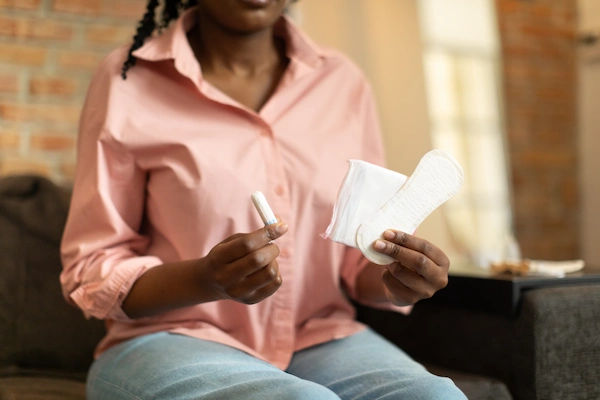What Leads To Delayed Period
A delayed period can be worrying if your cycle is usually regular. Explore the most common reasons for late periods, what doctors look for, helpful self-care tips, and when to seek medical advice through Apollo24|7.


Introduction
A delayed period can be unsettling, especially if your cycles are predictable. While pregnancy is often the first thought, there are many possible causes—from stress and travel to hormonal conditions such as PCOS or thyroid disorders. The good news is that most reasons for a delayed period are manageable once you understand the root cause. In this guide, we explain what counts as “late,” review the common causes of a delayed period, what doctors do during evaluation, and practical steps you can take at home. We also cover when to seek medical care and tests that may help, including home sample collection with Apollo24|7. If symptoms persist beyond two weeks, consider consulting a doctor online with Apollo24|7 for further evaluation. Let’s break it down in a clear, calm, and reassuring way.
What Counts as a Delayed Period?
Understanding what “late” means helps you decide your next steps.
A delayed period simply means your bleed starts later than expected based on your usual cycle. While many assume the
textbook menstrual cycle is 28 days, the normal range is between 21–35 days in adults, and 21–45 days in teens. It’s
also normal for cycle length to shift by a few days month-to-month. Ovulation timing drives when your period comes —
if ovulation happens late, your period will too.
Consult a Top Gynaecologist for Personalised Advice
How late is considered late?
Many clinicians consider a period “late” if it’s more than a few days beyond your typical pattern. A missed period
usually means the entire cycle has passed without bleeding. And when someone misses three cycles in a row (or six
months if cycles were previously irregular), this is called secondary amenorrhoea, which usually requires a check-up.
You can track your cycle by logging:
- First and last day of bleeding
- Flow intensity
- PMS symptoms
- Signs of ovulation (like cervical mucus changes)
If your period is over a week late and pregnancy is possible, take a test. If negative but still late, repeat after 48–72 hours. If cycles become longer than 35–40 days regularly, or you miss multiple cycles, speak with a doctor. If symptoms persist beyond two weeks, consider an online consultation with Apollo24|7 for personalised advice.
What Leading Articles Cover — and What They Miss
Popular health content tends to emphasise the “big five” causes:
- Pregnancy
- Stress
- Weight or exercise changes
- PCOS
- Thyroid disorders
These articles do well at highlighting common reasons and advising when to seek help.
However, they often miss important practical details such as:
- Clear timelines on testing and monitoring
- The role of disrupted sleep and travel
- How medications (other than contraceptives) can affect cycles
- Less common but important causes like pituitary issues or uterine scarring
- A step-by-step self-care approach based on your situation
This guide keeps everything you need in one place so you can take confident actionn
Common Causes of a Delayed Period
Most delayed periods fall into predictable categories.
A delayed period can stem from:
Pregnancy-related changes
- Early pregnancy
- Very early pregnancy loss (chemical pregnancy)
- Post-miscarriage or postpartum changes
- Breastfeeding affecting ovulation
Lifestyle triggers
- Stress
- Major weight change
- Low energy intake vs activity level
- Very intense training routines
- Jet lag or shift work disturbing sleep rhythms
Hormonal conditions
- PCOS
- Thyroid problems
- Elevated prolactin
- Perimenopause or premature ovarian insufficiency
Medications and contraception
- Hormonal pills, patches, rings
- IUDs or implants
- Emergency contraception
- Some psychiatric or steroid medications
Medical illnesses
- Diabetes
- Celiac disease (with nutrient malabsorption)
- Chronic or acute illness affecting recovery
A useful lens to view this through is stress stacking: when emotional stress, poor sleep, and heavy training pile up together, the menstrual cycle becomes more sensitive and often delayed.
Pregnancy, Postpartum, and Breastfeeding
If pregnancy is possible, test first — it’s the most common reason for a delayed period.
Pregnancy tests usually become accurate from the first day of a missed period. If the test is negative but your period still
doesn’t arrive, retest after 2–3 days.
A chemical pregnancy (a very early loss) can make your period slightly late or heavier than usual. After a miscarriage,
bleeding often resumes after 4–6 weeks — but there’s a wide range.
If you recently had a baby, delayed cycles are normal:
- Exclusive breastfeeding → ovulation suppressed
- Spacing night feeds or weaning → ovulation resumes gradually
Think of ovulation returning postpartum like a dimmer, not a switch — it slowly brightens over time.
If you have a positive pregnancy test plus severe pelvic pain, dizziness, or shoulder-tip pain → seek urgent care to rule out an ectopic pregnancy.
For unclear test results or delays beyond two weeks, consult Apollo24|7 for a tailored plan and blood tests.
Lifestyle Triggers You Can Modify
Daily habits have a powerful impact on ovulation timing.
Stress affects hormones
Cortisol rises during psychological stress, which can suppress ovulation. Major stress events may delay a cycle; chronic stress may disrupt several.
Low energy availability
Not eating enough for your activity level — even unintentionally — can switch your body into energy-saving mode and
delay ovulation.
Common in:
- Students
- Dancers
- Endurance athletes
- New parents juggling everything
Exercise overload (RED-S)
High-intensity training + low fuel can lead to:
- Delayed periods
- Fatigue
- Injury risk
- Low mood
Travel and disrupted sleep
Crossing time zones or working nights upsets the body clock, interfering with reproductive hormones.
Cycle Safety Net tips:
- 7–9 hours of sleep
- One extra weekly rest day during stressful periods
- Three balanced meals + healthy snacks
- Pre-and-post workout fuelling
These small adjustments often get cycles back on track.
Hormonal and Gynaecological Conditions
Some medical conditions make delayed periods more likely.
PCOS (Polycystic Ovary Syndrome)
Causes irregular ovulation, acne, and sometimes excess facial/body hair. Cycles may be long, unpredictable, or absent.
Thyroid conditions
Both underactive and overactive thyroid can shift cycle timing and flow. Simple blood tests help diagnose, and
treatment usually corrects cycles.
High prolactin and pituitary concerns
Elevated prolactin can:
- Delay or stop periods
- Cause breast discharge
- Lead to headaches or vision changes
Perimenopause, POI, Asherman’s syndrome
- 40s = natural changes in cycle length
- Before 40, with delayed cycles, could suggest early ovarian insufficiency
- Suddenly light or absent bleeding after uterine surgery may indicate scarring inside the uterus (Asherman’s)
Patterns over time help doctors pinpoint the most likely reason.
Medications, Birth Control, and Devices
Changes in contraception often bring changes in bleeding patterns.
Hormonal pills, patch, or ring
Withdrawal bleeds may change with new methods or when switching brands.
IUDs, implants, and injections
- Periods may become lighter or stop temporarily
- Usually not harmful, but report new severe pain or heavy bleeding
Emergency contraception
It can make your next period early or late by up to a week. If more than a week late, repeat a pregnancy test.
Other medicines
Antipsychotics, chemotherapy, some antidepressants, and long-term steroids can delay cycles. If timing changes after
starting a new medicine, ask whether it influences reproductive hormones.
Important: Bleeding on contraception does not reliably indicate ovulation.
Medical Illnesses Beyond the Pelvis
Your whole-body health influences your cycle.
Diabetes and insulin resistance
It can disrupt hormonal messaging and delay ovulation.
Celiac disease
Nutrient malabsorption may affect hormone balance. Treating the underlying condition can restore regularity.
Infections and recovery
Acute illness — including viral infections — may temporarily shift ovulation. A recovery window of 1–3 cycles is
normal.
If delays continue longer, get a medical review.
Diagnosis and Tests: What to Expect
Doctors investigate step-by-step to pinpoint the root cause.
History and physical exam
Discussion focuses on cycle pattern, stress, weight change, medications, hair/skin changes, thyroid symptoms, or pelvic
pain.
Blood tests
Common initial tests:
- Pregnancy test
- Thyroid function (TSH)
- Prolactin
- Androgens (for suspected PCOS)
- Ovarian hormones (FSH/LH in some cases)
Imaging
Pelvic ultrasound checks:
- Ovarian appearance
- Uterine lining
- Structural concerns
If prolactin is very high, a pituitary MRI may be recommended.
Home sample collection for thyroid, prolactin, and other hormonal tests is available through Apollo24|7 for
convenience.
If your period is delayed more than 14 days with negative pregnancy tests, or changes have become frequent, consult
Apollo24|7 for timely evaluation.
Self-Care, Prevention, and Tracking
A few steady habits help maintain cycle health.
Smart tracking tips
Log:
- First day of each period
- Symptoms
- Sleep
- Stress
- Workouts
- Any big life changes
Patterns make causes clearer.
Nutrition that supports ovulation
- Balanced protein + complex carbohydrates
- Avoid long fasts on heavy training days
- Ensure iron, B12, iodine, and vitamin D
- Test nutrient levels via Apollo24|7 if needed
Stress relief tools
- Breathwork
- Outdoor walks
- Sleep routine
- Relaxing bedtime habits
Training adjustments
If delays happen frequently during workouts:
- Add rest
- Space out high-intensity days
- Fuel adequately
Cycle Buffer Tip:
Add 30–60 minutes daily for recovery, especially during stressful periods.
When to Seek Care and Red Flags?
Timely attention keeps you safe.
When to get checked
- More than 7 days late and pregnancy possible → test
- More than 14 days late with negative tests → consult a clinician
- 3 missed periods in previously regular cycles
- 6 missed periods if cycles were always irregular
Urgent symptoms — see a doctor immediately
- Severe pelvic pain, fainting, or dizziness
- Shoulder-tip pain with a positive pregnancy test
- Soaking through more than a pad/tampon per hour for over 2 hours
- New severe headaches, vision changes, or breast discharge
For non-emergency concerns, Apollo24|7 offers quick access to doctors online.
Myths vs Facts About a Delayed Period
Let’s separate common beliefs from the truth.
- Myth: “No bleed means no ovulation.”
- Fact: Ovulation can happen before your first postpartum or delayed bleed.
- Myth: “Only weight loss delays periods.”
- Fact: Weight gain, stress, and night shifts also affect ovulation.
- Myth: “A pill bleed is a real period.”
- Fact: It’s a hormone-withdrawal bleed.
- Myth: “Under 40 means I’m safe from ovarian issues.”
- Fact: Early ovarian insufficiency can occur before 40.
Conclusion
A delayed period is common and often temporary — especially during stressful seasons, after travel, or when training ramps up. Still, ruling out pregnancy is important. If delayed cycles become frequent or unpredictable, hormonal or medical causes like PCOS or thyroid disease may be involved. The right tests — often just a few blood samples and an ultrasound — can provide clarity.
Meanwhile, prioritising sleep, balanced nutrition, and managing stress can help get your cycle back on track. If your period is delayed by more than two weeks, or you’ve missed multiple cycles, connect with a doctor through Apollo24|7 for personalised guidance and home sample collection options. With the right support, most people restore regularity and feel more confident navigating their cycles.
Consult a Top Gynaecologist for Personalised Advice
Consult a Top Gynaecologist for Personalised Advice

Dr. Sreeparna Roy
Obstetrician and Gynaecologist
8 Years • MBBS , MS (OBSTETRICS & GYNAECOLOGY), Fellowship in Infertility, Endoscopy & Ultrasonography), Fellowship in Laparoscopy & Hysteroscopy,DRM
Kolkata
Dr Utsa Basu Clinic, Kolkata

Dr. Sai Lakshmi Daayana
Gynaecological Oncologist
18 Years • MBBS, MRCOG
Hyderabad
Apollo Hospitals Jubilee Hills, Hyderabad
(225+ Patients)

Dr. Revathi S Rajan
Obstetrician and Gynaecologist
24 Years • MBBS, DGO, DNB.FFMM
Bengaluru
Apollo Clinic, JP nagar, Bengaluru
Dr. B Shravanthi Reddy
Radiation Specialist Oncologist
8 Years • MBBS, DNB(Radiation Oncology)
Manikonda Jagir
Apollo Clinic, Manikonda, Manikonda Jagir

Dr. Sushith C
General Physician
2 Years • MBBS
Bengaluru
PRESTIGE SHANTHINIKETAN - SOCIETY CLINIC, Bengaluru
Consult a Top Gynaecologist for Personalised Advice

Dr. Sreeparna Roy
Obstetrician and Gynaecologist
8 Years • MBBS , MS (OBSTETRICS & GYNAECOLOGY), Fellowship in Infertility, Endoscopy & Ultrasonography), Fellowship in Laparoscopy & Hysteroscopy,DRM
Kolkata
Dr Utsa Basu Clinic, Kolkata

Dr. Sai Lakshmi Daayana
Gynaecological Oncologist
18 Years • MBBS, MRCOG
Hyderabad
Apollo Hospitals Jubilee Hills, Hyderabad
(225+ Patients)

Dr. Revathi S Rajan
Obstetrician and Gynaecologist
24 Years • MBBS, DGO, DNB.FFMM
Bengaluru
Apollo Clinic, JP nagar, Bengaluru
Dr. B Shravanthi Reddy
Radiation Specialist Oncologist
8 Years • MBBS, DNB(Radiation Oncology)
Manikonda Jagir
Apollo Clinic, Manikonda, Manikonda Jagir

Dr. Sushith C
General Physician
2 Years • MBBS
Bengaluru
PRESTIGE SHANTHINIKETAN - SOCIETY CLINIC, Bengaluru
More articles from Menses Disorder
Frequently Asked Questions
1) How many days is normal for a late period?
A few days’ variability is common. In adults, cycle lengths between 21 and 35 days are normal. If your period is delayed by more than 7 days, test for pregnancy if possible; if it’s delayed beyond 14 days with negative tests, consult a clinician [1][2][3].
2) Can stress cause a delayed period even if I’m not pregnant?
Yes. Stress can alter GnRH pulses and delay ovulation, leading to a delayed period. Sleep debt, travel, and intense training add to the effect. Try stress reduction, consistent sleep, and adequate nutrition; seek care if delays persist.
3) Can emergency contraception delay my period?
Yes. Levonorgestrel or ulipristal emergency contraception can make your next period come earlier or later, often within a week. If your period is more than a week late after EC, take a pregnancy test and follow up [4].
4) Does PCOS cause late periods every month?
PCOS often features inconsistent ovulation, leading to irregular and delayed periods. Treatment focuses on ovulation support, metabolic health, and symptom control. If you suspect PCOS, ask about screening labs and an ultrasound [5].
5) What tests do I need if my period is late but I’m not pregnant?
Common tests include TSH (thyroid), prolactin, and sometimes FSH/LH and androgens to evaluate PCOS or ovarian function. Ultrasound may be suggested. Apollo24|7 offers home collection for many labs.

